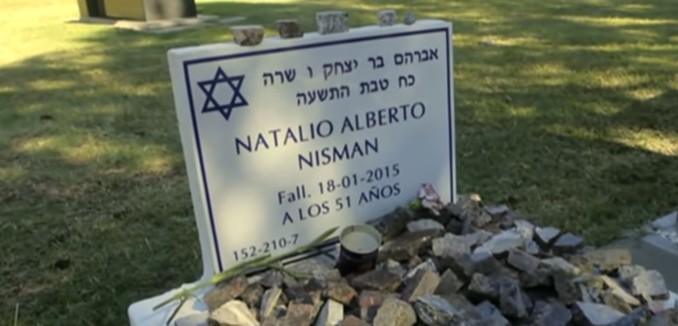A three judge panel unanimously referred the investigation into the death of Argentine special prosecutor Alberto Nisman to a federal court, where political murder cases are handled, the Jewish Telegraphic Agency reported Tuesday.
Two of the three judges explained in the decision that “it is plausible to give credit to the hypothesis suggested by the accusers, both public and private, to assume that the death of Alberto Natalio Nisman could also be a result of the activity of a third party.”
Sandra Arroyo Salgado, a former federal judge and Nisman’s ex-wife, cried as she said during a hearing last Friday that Nisman’s death “was the most serious institutional event to affect Argentina since the return of democracy.”
At the hearing, Manuel Romero Victorica, a lawyer for Salgado, read one of the threats that Nisman received in the last weeks of his life. “We will make true our promise to kill you and your family, but before that, we will make you look like shit in public and in the media,” one message read. “We’ve already managed to separate you from the AMIA case and we’ve gotten Argentina a deal with Iran without you.”
A lawyer for Sarah Garfunkel, Nisman’s mother, asked the judges to send the case to a federal court. “Nisman was assassinated so as to impede the progress of his work on behalf of the state,” said the attorney, Pablo Lanusse. “This case is screaming for a transfer to the federal courts because it must be recognized that Nisman was murdered.”
The drive to move the case to the federal courts picked up steam last month after Antonio “Jaime” Stiuso, Argentina’s former head of intelligence operations, testified that former Argentine president, Cristina Fernández de Kirchner, had ordered the hit on Nisman.
“They killed Nisman because of the work he was doing,” Stiuso said during a 17-hour testimony. “The author of all this madness was that woman, Cristina Fernandez de Kirchner,” he continued. “When the madness of the former president became explicit, I had to take my family and move.”
Stiuso also referred to Iran, saying, “When you have these people as your enemy, there’s no point in having bodyguards.”
Mauricio Macri, who was elected president of Argentina in December, said last week that his country would “make headway” in the investigation of Nisman’s death. After he assumed office, Macri’s government declared that it would not renew an accord with Iran to jointly investigate the 1994 bombing of AMIA Jewish center in Buenos Aires. Iran is a chief suspect in the case.
Shortly after Macri’s new government said that it would scrap the agreement, terrorism expert Matthew Levitt wrote that it was important to investigate “the Iranian agents in Argentina who pursued the deal on Tehran’s behalf.”
Argentine prosecutor Alberto Nisman, who investigated the ties between Iran and the AMIA bombing, as well as a cover up by the previous Argentine government of Iran’s role in the attack, was found dead with a bullet wound to the head last January. His death came hours before he was scheduled to present his findings to a closed session of the Argentine Congress. Prosecutor Ricardo Sáenz concluded late last month that Nisman was murdered and recommended that the investigation into his death be referred to a federal court.
Eamonn MacDonagh, contributing editor to The Tower, has written extensively on the Nisman case. In Alberto Nisman’s Secret Recordings, Revealed, which was published in the July 2015 issue of The Tower Magazine, MacDonagh exposed some of the back channel dealings between the Argentine government’s representatives and Iranian interlocutors.
[Photo: BBC News / YouTube ]




